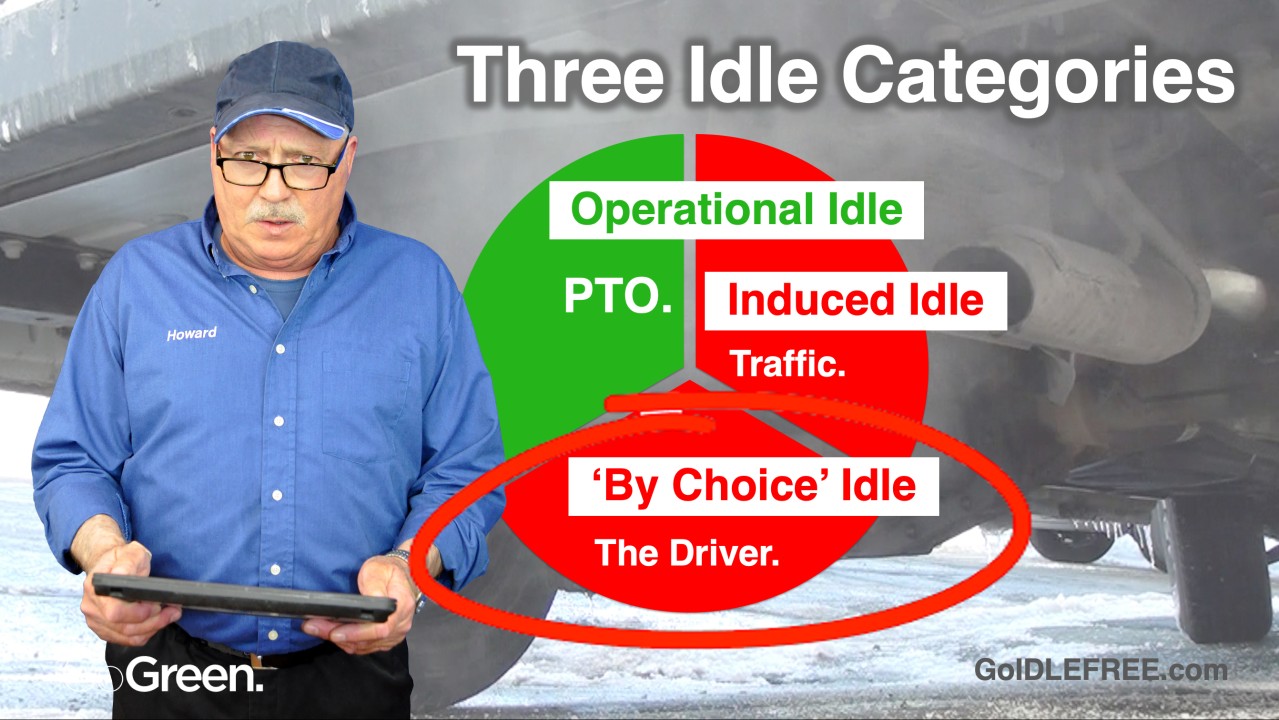
The Three Categories of Idling; One Has the Biggest Impact on Fuel and Emissions
By Ron Zima ADpPR
GoGreen Communications Inc.© 2021
The challenge for fleet leaders here in 2021 is the ongoing obligation to: improve their organization's finances, reduce fuel burn, reduce exhaust pollution, and reduce greenhouse gas emissions while enhancing their fleet's reputation.
When fleet financial executives run the numbers on idle time, we think they will agree: idle reduction could be their vocational fleet's greatest cost and GHG reduction opportunity. Keep in mind, however, idle reduction has also frustrated fleet managers for several generations now. That’s because idle time is controlled by the driver's biases about idling behavior.
Today, since the advent of AVL telematics data, the categories of types of idling events have become much clearer and can help determine the best idle reduction strategies and technologies. As the experts in idle reduction driver behavior modification, GoGreen Communications recognizes that there is a lot of vehicle idle time beyond the control of the fleet manager.
It’s our view that there are three distinct categories of idling in the vocational fleet market:
- Operational idle, the driver is performing a job function.
- Induced idle, the driver has no choice.
- By choice idle, the driver has a choice.
Let’s take a closer look and provide examples for each category of idling behavior.
Operational idle is revenue-generating idling required to perform a job function. For example, using power take-off (PTO) for running tools and circuits from the truck’s main power plant (the engine).
Induced idle is where the driver largely has no choice but to idle. Stuck in traffic congestion, for example.
By choice idle is largely the choice of the driver. This is where the engine may be kept running while the driver is eating their lunch, checking email, making phone calls, waiting for a colleague, etc.
From our research, the majority of drivers across North America are in the grip of 60s and 70s era idling myths and outdated idling behaviors; “idling is good, restarts are bad, long warm-ups are necessary.” So, although a fleet operator can invest in idle reduction control systems, these systems can be greatly affected by how the drivers perform behind the wheel, and if they have a personal bias towards idling.
GoGreen’s unique approach transforms idling beliefs and behaviors with an eLearning program that emotionally engages drivers. The award-winning content speaks to three values that we share universally as drivers, relative to how idling impacts the things we really care about: 1. our kids, 2. our cash, 3. our cars and trucks.
GoGreen’s IDLE FREE for our kids® program acts as the bridge between outdated driver idling beliefs and behavior, which can effectively reduce idle in any class of fuel-burning vehicle.
The approach begins with upgrading employees' understanding on idling today’s engine technologies and transforming them into fans of the fleet operator’s idle reduction strategy. From our experience, this is largely achievable and can be accomplished in a relatively short period of time.
Following 3 hours of behavior modification coaching, (administered over a four-to-six week schedule) the majority of those exposed to the emotionally engaging videos and interactive quizzes are then likely to idle only ‘when parked and when it makes sense’.
From GoGreen’s history and experience (which began in partnership with an elementary school in 2006) 80% of participants, both genders, all ages, and backgrounds, are highly receptive to the program, altering their idling beliefs and behavior.
There are some who may say that all this talk of driver behavior in internal combustion engines is a moot point anyway. This, because of the exciting and rapidly evolving alternative fuel and electric vehicle (EV) technologies.
George Survant, Senior Advisor at GoGreen Communications Inc. and an expert on EVs and alternative fuel technologies, says that despite these developments, EV market penetration remains low. “It’s going to take a significant amount of time to replace gasoline and diesel assets for operators,” Survant says.
“Sales data versus the existing fleet of licensed vehicles indicates that sales of all versions of electrics both in the U.S. and Canada reveal that less than 2% of all vehicles sold are some variety of electric,” Survant says. “Meanwhile, the opportunity to reduce operating costs and emissions in a fleet operator’s gasoline and diesel assets by influencing driver idling behavior is enormous,” he says.
GoGreen poses two rhetorical questions to fleet operators:
- How long will it take to convert 50% of the fleet to newer technology that will make a recognizable reduction on its emissions footprint and fuel spend?
- During this time, what will be the fleet operator’s cost reduction, emissions reduction strategy with their gasoline and diesel assets?
Let us know your thoughts and be a part of our ongoing idle management feedback loop.
IDLE FREE for our kids® Training. Certification. Branding.
Fleets cut costs. Look like heroes. GoIDLEFREE.com
#fleet #equipmentoptimization #idlereduction #idle #idling #antiidling #idlemanagement #LongobartRoss #idlefreeguy #IDLEFREE #certification #sustainability #auto #emissions #GHGemissions #climate #truck #carbon #motor #fleet #fuel #ELD #AVL #GPS #telematics #elearning #safety #business #analytics #data #energy #transportation #commercialvehicle #gas #ecodriver #driver #drivertraining #diesel #road #carbon #freight #EVs #maintenance #ford #navistar #bergstrom #NAFAFleet #fleetmanagement #spendmanagement #spendanalytics #roguespending #fleetoperations #fleetmanager #COVID19
Trucking Safety Champion | CVOR & CSA/SMS Expert | Dedicated to Safer Roads
3yThanks Ron, Great stuff